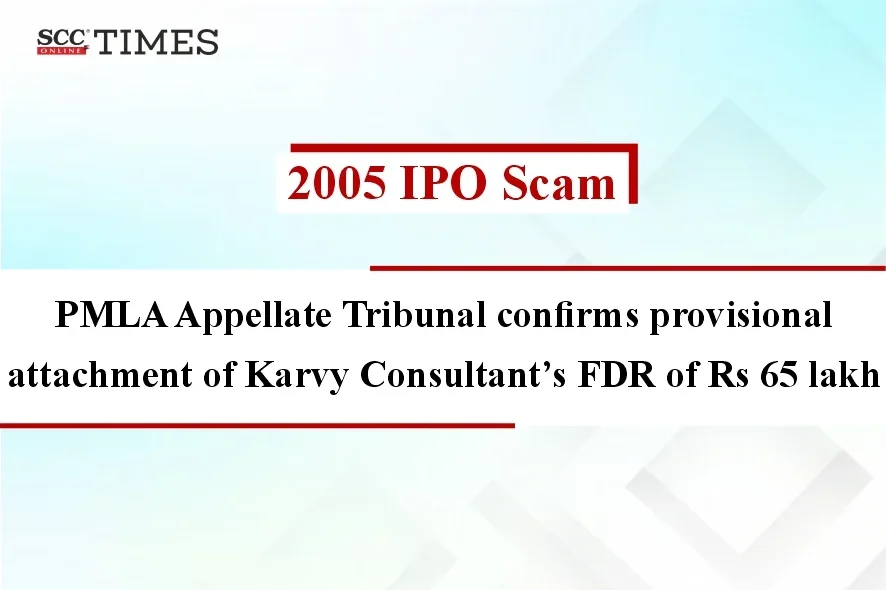Prevention of Money Laundering Act, Appellate Tribunal, New Delhi: An appeal was filed by Karvy Consultants Ltd. (‘appellant’) against the order passed by the Adjudicating Authority (‘AA’) under the Prevention of Money Laundering Act, 2002 (‘PMLA’) whereby the Provisional Attachment Order (‘PAO’) of FDR of Rs 65 lakh in the name of Karvy Consultants was confirmed. Balesh Kumar (Member) observed that the amount was nothing but proceeds of crime received from the key operators in the 2005 IPO Scam. Further, Karvy Consultants processed the applications of fictitious applicants for the purpose of transferring the allotted shares from them to the key operators and also received Rs 1 crore from the key operators.
Background:
Securities Exchange Board of India (‘SEBI’) found that certain entities had cornered 2005 IPO shares of Yes Bank Ltd. and Infrastructure Development Financial Corporation (‘IDFC’), which were meant for the Retail Individual Investors (‘RII’) category. The shares were procured in the names of fictitious or Benami entities and transferred to the demat accounts of key operators. They sold the shares at a much higher price before their listing, earning huge profits, which led to the filing of FIR in 2007. The Enforcement Directorate issued a PAO on 30-9-2013 which provided for the attachment of the FDR of Rs 65 lakh in the name of Karvy Consultants Ltd., with UCO Bank, Hyderabad. The AA by its order dated 18-3-2014, confirmed the PAO and the said order was challenged by the appellant.
The appellant alleged that the PAO was issued without establishing the ingredients of Sections 5(1) and 8 of the PMLA. It was argued that the proceeds of crime could not be in the form of FDR, but only shares meant for retail investors or the sale proceeds of such shares. The amount of Rs 65 lakh was accounted for as earnings from services provided in the ordinary course of business. Further, a charge of Section 467 of the Penal Code, 1860 (‘IPC’), as the scheduled offence, was also raised against the appellant but it denied being involved in the alleged forgery and stated that the offence was incorporated in the Schedule to the PMLA only on 1-6-2019 while the IPO scam was related to the period of 2005. The SEBI order dated 28-1-2014 was also referred to, which noted the fabrication of the bank introductions but did not conclusively establish that the appellant or its affiliates fabricated it.
The respondent justified the PAO by stating that the proceeds of the crime, estimated to be around Rs 1 crore, were generated by the scheduled offences committed by the key operators in connivance with the appellant. Further, the appellant’s employee made a statement that he was not sure of the genuineness of the addresses of the applicants for the demat accounts or the bank introduction letters. Also, it was because of the presence of Karvy that the banks took it for granted that the existing demat accounts with Karvy met the compliance of KYC norms. The respondent also pointed out that this Tribunal had dismissed the appeals of other key operators.
Analysis and Decision:
The Tribunal observed that the investigations, besides bringing out the findings of SEBI and of CBI, revealed the cornering of the IPO shares under the RII category by the key operators in the names of fictitious entities. Thus, the investigation along with the Original Complaint, the PAO, and other materials placed before the AA, established the ingredients of Sections 5(1) and 8(1) of the PMLA. The Tribunal noted that the banks, relying on the presence of the appellant, presumed that the demat accounts had complied with the KYC norms, which facilitated the loans against bank accounts of bogus customers for making investment in shares. The appellant thus played an active role in allowing the key operators to corner the shares meant for RII.
The Tribunal relied on Vijay Madanlal Choudhary v. Union of India, (2023) 12 SCC 1, wherein it was held that the relevant date was the date on which the person indulged in the process or activity connected with such proceeds of crime, and held that since the provisional attachment was effected much after the inclusion of Section 467 IPC in the Schedule to PMLA, it was valid.
The Tribunal highlighted that the order of the AA clarified that Karvy Group had received around Rs 1 crore from the key operators and after the payment for cost of funds they were left with net income of approximately Rs 72 lakh. The appellant had admitted that from the said fund, a FDR of Rs 65 lakh was made with UCO Bank, Hyderabad. Thus, the Tribunal agreed with the findings of the AA that the income generated was nothing but proceeds of crime as the same had been earned from the key operators.
The Tribunal, after considering that the appellant was not involved in the conspiracy as it was not the recipient of the tainted shares, observed that the appellant processed the applications of fictitious applicants for the purpose of transferring the allotted shares from them to the key operators and also received Rs 1 crore from the key operators. The Court opined that a professional group like Karvy could not abdicate its responsibility of ensuring genuine transactions and the failure to exercise due diligence with respect to the work facilitated the key operators to earn huge profits out of the mala fide allotment of shares of the two entities i.e., Yes Bank Ltd. and IDFC in their IPO subscription.
Considering the abovementioned analysis, the Tribunal did not find merit in the appeal and dismissed it.
[Karvy Consultants Ltd. v. Enforcement Directorate, 2025 SCC OnLine ATSAFEMA 6, decided on 1-7-2025]
Advocates who appeared in this case :
For the Appellant: Rishbha Arora, Advocate.
For the Respondent: Anubha Bhardwaj, Advocate.



